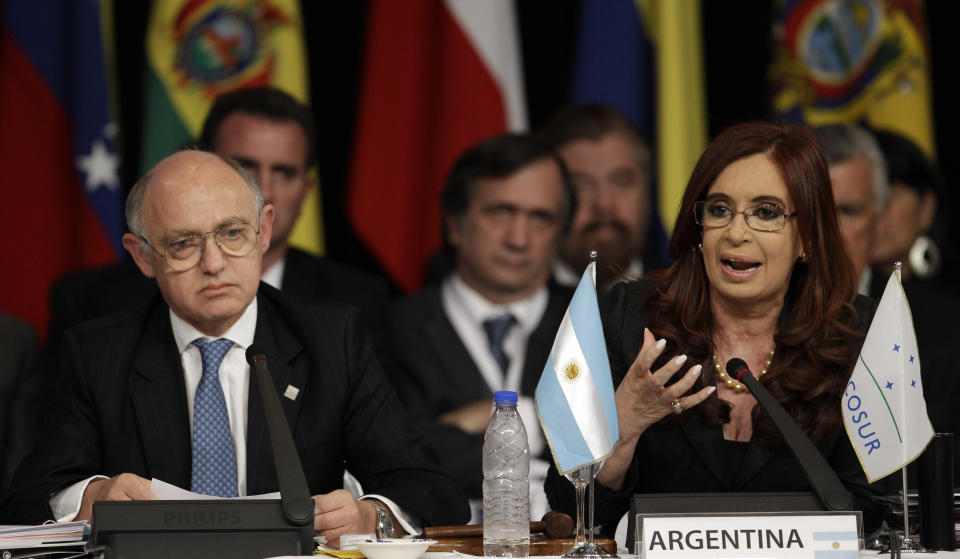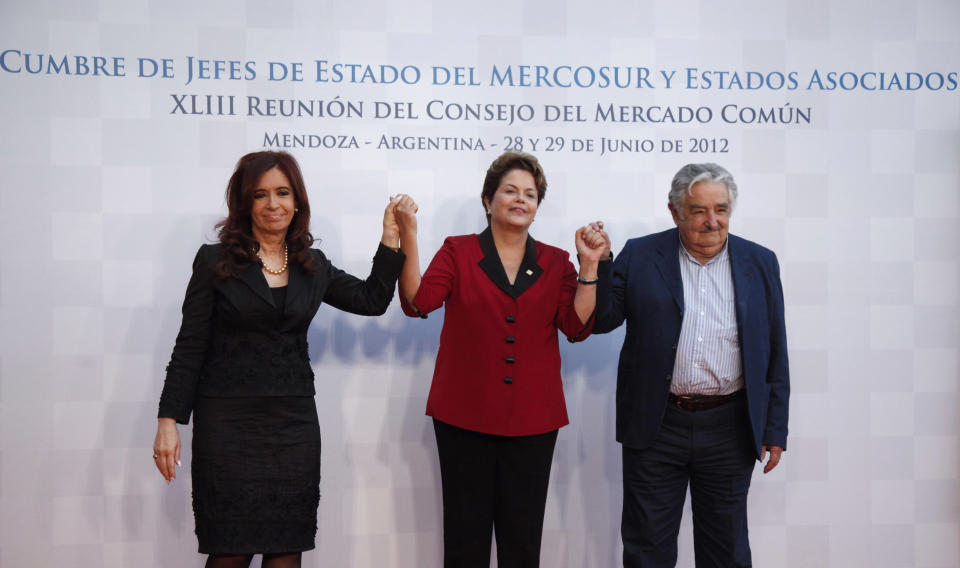Questions raised on Venezuela joining Mercosur
BRASILIA, Brazil (AP) — More than six years after Hugo Chavez said that joining Mercosur was Venezuela's destiny, the presidents of Argentina, Brazil and Uruguay have decided that his oil-rich nation will finally become the fifth full member of the common market.
Venezuela holds the world's largest crude oil reserves and the move potentially links the region's top energy and agricultural suppliers.
But the decision at last week's summit to welcome Venezuela into Mercosur after the leaders temporarily suspended Paraguay has brought questions about the move's timing and legality. Such decisions must be unanimous under Mercosur rules, and Paraguay's senate has long objected to Venezuela's membership.
"Venezuela's entry into Mercosur was carried out through an announcement ... but there's no legal or diplomatic protocol that guarantees its entry. There's nothing in writing," said Paraguay's new foreign minister, Jose Felix Fernandez.
Fernandez assumed that post after President Fernando Lugo was impeached and removed by Paraguay's congress. Other Mercosur countries criticized the one-day trial as an "institutional coup" and suspend Paraguay's membership.
Venezuela's foreign minister, Nicolas Maduro, assured that his country has indeed become a full Mercosur member after years as an associate member. "Now the legal step will be taken," he said.
Lugo had supported Venezuelan membership in Mercosur, but conservative Paraguayan lawmakers criticized Chavez as anti-democratic and opposed bringing his country into the group. Suspending Paraguay after Lugo's ouster removed the Paraguayan veto.
The full deal still needs to be signed July 31 at Mercosur's next meeting in Rio de Janeiro. But despite vows of challenges in international courts by conservative lawmakers in Paraguay and Uruguay, some analysts say the move was legal — even if it was opportunistic.
"This was a decision that had the consent of three presidents," said Antonio Jorge Ramalho, a professor of international relations at the University of Brasilia. "According to Mercosur statutes, decisions are taken by consensus within the bloc."
Consensus has rarely been achieved within the group, which was founded in 1991 to foster open trade through shared customs rules. Despite that goal, Argentina and Brazil limit imports, leading the smaller Paraguay and Uruguay to accuse the regional powerhouses of protectionism.
While suspending Paraguay until its next presidential election, the other Mercosur presidents decided against imposing economic sanctions over Lugo's ouster, a move that would have been a big blow to the landlocked country, which is among South America's poorest nations. Half of Paraguay's trade is with Argentina, Brazil and Uruguay.
Other associate Mercosur members include Bolivia, Chile, Colombia and Peru, but they have limited influence in the group and lack veto power.
Among the more prominent critics of Venezuela's entry is Uruguayan Foreign Minister Luis Almagro, who suggests that Argentina and Brazil forced the decision on much smaller Uruguay.
Argentina responded that their foreign ministers and legal advisers certified that making Venezuela a full member complied with Mercosur rules.
Economic analyst Mauricio Claveri, at the Argentina-based consulting firm Abeceb.com, agrees.
"It's based on the rules and it's legitimate, because Paraguay was suspended not only from participating in Mercosur and discussing its decisions, but also from voting on decisions and from vetoing them," Claveri said.
Other critics of the vote say that inviting Chavez onto the stage could weaken Mercosur's influence and undercut its commitment to upholding democratic institutions. Chavez, an outspoken critic of the United States, is often accused of stifling Venezuela's press and strong-arming foreign investors.
"Venezuela doesn't meet the basic requirements to enter Mercosur," Jose Botafogo Goncalves, a Brazilian diplomat and former Mercosur representative, told the Brazilian newspaper O Globo. "Venezuela's problem is Chavez, who doesn't like free trade and wants to transform the bloc into a political platform."
Ramalho, the international relations professor, said that although Venezuela is not an ideal democracy it is far from a dictatorship and it is better to keep it close than to isolate it. Chavez, who has been undergoing treatment for cancer for more than a year, is running for the presidency again in October.
Venezuela already supplies oil to several countries in the region at a low cost, and its entry into Mercosur opens the possibility of bringing energy at an even lower cost and with fewer restrictions across borders.
In return, Argentina and Brazil could provide import-dependent Venezuela with more of the products that have become limited after Chavez's socialist-oriented government nationalized a number of industries and restricted trade.
For Argentina it could mean "the possibility of having a country that can support them and become a counterweight to Brazil's dominance," Claveri said.
As for Brazil, Ramalho said Venezuelan membership could encourage energy integration and ease transportation of goods with northern states in South America that have failed to benefit from Mercosur.
Chavez's political leanings will be irrelevant, because the bloc increasingly focuses on economic integration, said Chilean lawmaker Juan Pablo Letelier.
"This is a continent that's constantly changing," Letelier said. "The ideology behind the governments doesn't matter much."
___
Associated Press writers Almudena Calatrava in Buenos Aires, Argentina; Pedro Servin in Asuncion, Paraguay; and Federico Quilodran and Luis Andres Henao in Santiago, Chile, contributed to this report.



